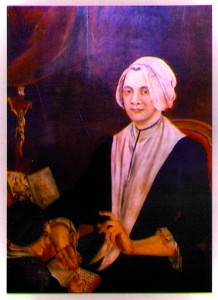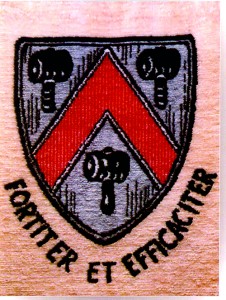The hearth is kept burning by the Perpetual Help Sisters
Today, we often hear of “Jubilees and Celebrations”- copper, silver, gold, diamond and sapphire jubilees of priesthood, religious life, married life, or of any congregation, church or establishment.
The provenance of the word jubilee is “jobel” from the Hebrew language. It means the horn of a ram which is formed like a small trumpet. In the Old Testament a “jobel or trumpet” was used to announce a jubilee year.
The Congregation of Perpetual Help Sisters has a double jubilee this year- 85 years since the arrival of the first group of Sisters in 1929 from Belgium and the 60th anniversary (Diamond Jubilee) of the establishment of the novitiate in 1954.
The Order of Perpetual Help Sisters was founded by Johanna Francisca Maximiliana Amerlinck, who though from a wealthy family, abandoned everything in the service of the poor, especially- women and girls. Fortiter et Efficaciter- Fortitude and Efficacy being her motto, she stepped out of her comfort zone, to start the First “House of Charity “ in 1768 and became the first Superior General of this new religious group. Touched by God’s love, she manifested qualities of poverty, simplicity and humility, which attracted many other women to her first “House of Charity”.
The warmth of the hearth lit in Belgium soon spread across the seas. Belgian Sisters from the Mother House in Courtrai came over to Ceylon in answer to the appeal made by the Director of Medical Sanitary Services J.F.Bridge through the Archbishop of Colombo, Mgr. Coudert O.M.I. requesting Sisters to work in the Anti- Tuberculosis Institute in Sri Lanka.
The then Superior General, Rev. Mother Gertrude willing accepted the invitation though this call demanded that the missionary sisters break away from their near and dear ones, from their homeland and their culture. The six sisters accompanied by Rev. Mother Edmonda after a tedious journey by sea, arrived in Ceylon on April 22, 1929.They were warmly welcomed and introduced into the way of running a hospital in the local setting, by the Franciscan Missionaries of Mary who accommodated them before they assumed their service at the Chest Hospital, Ragama.

Mother Foundress: Johanna Francisca Maximiliana Amerlinck
On the feast of the Sacred Heart, they occupied the quarters built for them, adjoining the existing Chest Hospital serving the poor T.B. patients, risking their own lives, since at that time “Tuberculosis “ was a dreaded and highly infectious disease with no hope for a cure.
Mother Edmonda, Superior of the Convent, at the Chest Hospital felt the dire need to have more “helping hands”. Returning to Belgium in 1936 she came back to Ceylon with more Sisters- their number increased to 33. For the patients at the Chest Hospital, as well as the minor staff, the Sisters were “Angels of Mercy” whose loving service touched them all.
As the Sisters at the Chest Hospital increased in numbers, they looked out for other avenues to serve the poor in need. Unknown to them, Rev. Fr.Majorel O.M.I. had been keen to launch a Roman Catholic Institute for the education of deaf and blind children. In 1930 Rev.Fr.Majorel spoke to then Archbishop of Colombo Mgr. Marque and they met Rev.Mother Edmonda, who accepted the responsibility to offer training and education to these children. A plot of land, just behind St.Peter and Paul Church at Ragama was bought for this purpose. On March 8, 1935 three pioneer Sisters from Belgium started their service with a blind boy of nine years, brought by Rev.Fr.Zeitor O.M.I. the parish priest of St.Peter and Paul Church Ragama .As the children increased in numbers, the Sisters needed more staff as well as the help of lay staff.
On March 19, 1935 on the Feast of St. Joseph- Patron Saint of the school, Sr.Edward was appointed as the first Principal. In 1940 Sr.Blanda arrived in Sri Lanka and joined the community at St. Joseph’s School for the deaf and blind. In 1947 two more Sisters joined the staff and their services were extended to have a sewing class for the deaf girls.
In 1954, the doors were open to Sri Lankan girls to join hands with the Belgian Sisters to continue their services. A piece of land, behind the Church of Our Lady of Snows, at Advives Road, Periyamulla, was purchased.
Cardinal Thomas Cooray O.I.M. laid the foundation stone for the novitiate. The Sisters extended their loving service to the sick by opening a First Aid Post (dispensary) on the same premises at Periyamulla. This flame spread beyond, even to Pitipana and Kudapaduwa.
The missionary Sisters were forced to return to their motherland, Belgium, after rendering yeoman service for 42 years. We owe a debt of gratitude to the Belgian Sisters, who came across the seas to be of service to our people. The last of the Belgian Missionary Sisters left our island in 1971, but the flame was not extinguished. The torch was handed over to Sri Lankan Sisters. The Superior General remained in Belgium with allegiance to the bishop of Brugges.
Gradually the Sri Lankan Sisters journeyed towards new horizons. At the invitation of Cardinal Cooray they accepted the Home for Elders, Crèche and the Pre-school at Thimbirigasyaya, when the Dominican Sisters had to leave the country. The

Motto: Fortiter et Efficaciter- Fortitude and Efficacy
first group of Sri Lankan sisters arrived at Thimbirigasyaya in 1965.From then onwards up to this day, the work has been carried on without interruption, for nearly 49 years. After a few years, the Pre-school was converted into rooms for elders.
In 1976, the Sisters were offered a house and property at Kochchikade and got involved in formal and non-formal education in the community and school leavers. As time passed, the Pre- Novititate (a formation house) encouraging new recruits was set up.
June 6, 1982 was a red letter day as the Sisters became a local diocesan congregation under the jurisdiction of the Archbishop of Colombo, Nicholas Marcus Fernando with their own local Superior General. The Generalate is now in Periyamulla; Negombo.A new and difficult step began, where we drafted our own Constitution drawn up with the help of experts and the consultation of the Sisters. A specific feature of this Constitution is its attempt to “localise Religious life” adapted to our own culture, with emphasis on the traditional and other faith values of our people.
In 1996 on March 13, the Perpetual Help Convent started at Rajagiriya with two Sisters. The house was donated by a generous donor. As the years passed by the community members became three. The activities which started like a small mustard seed, began to grow and spread into a tree and today it has branched off to a Wage parish, demarcated by the Archbishop as the missionary Region of the Archdiocese, to offer service to the people in need. A pre-school for children of area was also begun.
Weralugama
As an extension of the apostolate for Hearing Impaired, a Training Centre for the deaf youth, for their self –employment at Weralugama was opened in 1998, with a poultry farm and an agriculture project –a two year course for both boys and girls, after their schooling at St. Joseph’s school for the deaf, at Ragama.
The training centre for the deaf youth of the St. Joseph’s Past Pupils Welfare Association of the deaf was functioning as “Sew smart” in a small rented house at Wattala temporarily. The providence of God was shown through the generosity of two donors, who donated a portion of their property at Moratuwa to put up a new building .With the aid of a donor agency, a three storeyed building was constructed .Sew Smart –St. Joseph’s Sewing Centre at Moratuwa was opened on October 2, 2002; orders are taken to stitch cassocks for priests, church vestments, to find an income for them and to run the Institute. Another school for them was begun at Kadawelagedera in 2001.
Another branch of our apostolate for the hearing impaired was started at Dalugama- Kelaniya in 1982, which despite its difficult beginings has grown to be a CEHIC -Centre for Education of Hearing Impaired Children.
The First Mission Abroad saw three Sisters being sent to Cyprus, to work among the Sri Lankan migrant women. Their services are very much sought by four other Catholic Churches in Nicosia, Lamaka, Limassol and Pathos.
In November 2013 two sisters accepted the challenge to move on to Israel.
In Pitipana, Negombo, the Perpetual Help Sisters were invited to run a Home for elderly ladies in 2005.There are 22 elderly ladies and only one Sister who manages the whole place with the help of lay staff.
Eppawela
Keeping with our priority to work for the hearing impaired, at the invitation of the Bishop of Anuradhapura, we started a school and a pre-school at Eppawela in 2005 on January 19.
On January 1, once again the Perpetual Help Sisters were offered a house and property at Lunuwila in the diocese of Chilaw, to shelter poor destitute children (Home for girls). Today the number of children has increased to 30 school going girls who are cared for by two Sisters.
The mission continues ‘Rooted in Christ, we commit ourselves to be constantly challenged by the poor and needy especially women and girls and to be fellow strugglers with them to a liberated life’.



